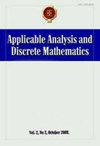涉及多函数的除差的完全单调性
IF 1.4
4区 数学
Q1 MATHEMATICS
引用次数: 1
摘要
对于r s ?R和?= min {r, s},让D[x + r, x + s;n ?1) ???N (x)是两个函数的除差? N ?1 = (?1)n ?(n?1) (n?N) on(??,?),其中?(N)表示多元函数。本文给出了函数x ?k i=1 ?mi (x) ?k k i=1 ni (x) x ?k i=1 ni (x) ?k ?SNK (x)在(??,?)上是完全单调的,其中mi, ni ?N对于i = 1,…k和k ?2和SNK = ?k i=1 ni。这些方法概括了已知的结果,并给出了问题的答案。本文章由计算机程序翻译,如有差异,请以英文原文为准。
Complete monotonicity involving the divided difference of polygamma functions
For r, s ? R and ? = min {r, s}, let D[x + r, x + s; ?n?1] ? ??n (x) be the divided difference of the functions ?n?1 = (?1)n ?(n?1) (n ? N) on (??,?), where ?(n) stands for the polygamma functions. In this paper, we present the necessary and sufficient conditions for the functions x ? ?k i=1 ?mi (x) ? ?k ?k i=1 ?ni (x) , x ? ?k i=1 ?ni (x) ? ?k?snk (x) to be completely monotonic on (??,?), where mi, ni ? N for i = 1,..., k with k ? 2 and snk = ?k i=1 ni. These generalize known results and gives an answer to a problem.
求助全文
通过发布文献求助,成功后即可免费获取论文全文。
去求助
来源期刊

Applicable Analysis and Discrete Mathematics
MATHEMATICS, APPLIED-MATHEMATICS
CiteScore
2.40
自引率
11.10%
发文量
34
审稿时长
>12 weeks
期刊介绍:
Applicable Analysis and Discrete Mathematics is indexed, abstracted and cover-to cover reviewed in: Web of Science, Current Contents/Physical, Chemical & Earth Sciences (CC/PC&ES), Mathematical Reviews/MathSciNet, Zentralblatt für Mathematik, Referativny Zhurnal-VINITI. It is included Citation Index-Expanded (SCIE), ISI Alerting Service and in Digital Mathematical Registry of American Mathematical Society (http://www.ams.org/dmr/).
 求助内容:
求助内容: 应助结果提醒方式:
应助结果提醒方式:


